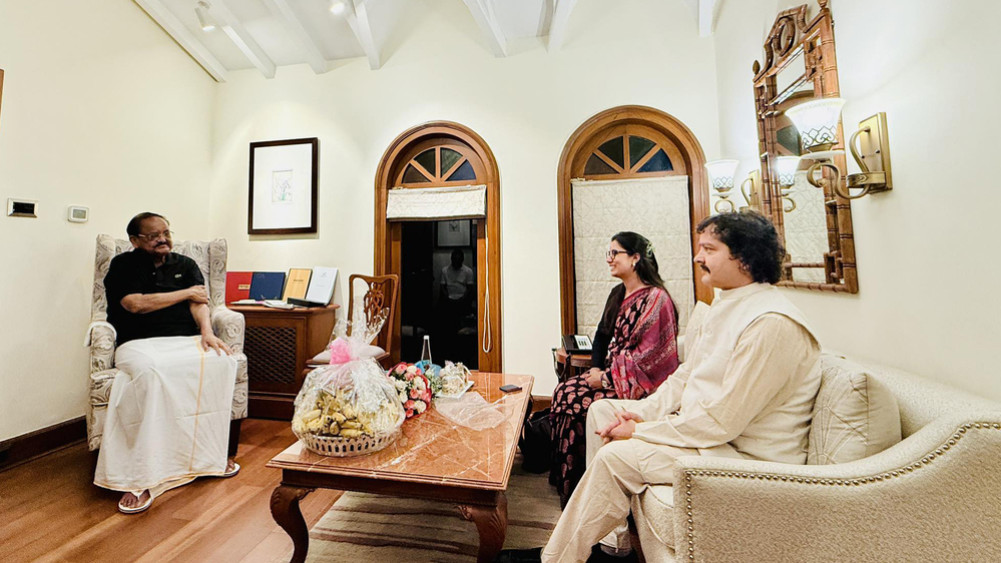Rabi Lamichhane’s Party Breaks China Ties, Turns to India’s Top Leader!

Rastriya Swatantra Party (RSP) Members of Parliament Sobita Gautam and Hari Dhakal recently traveled to India, where they held a significant meeting with former Indian Vice President M. Venkaiah Naidu. The encounter, which took place in New Delhi during their participation at the Overseas Nepali Coordination Forum’s Karnataka State Committee event, signals a notable shift in RSP’s diplomatic outreach, especially amid the evolving political landscape following the detention of their party chairman, Rabi Lamichhane.
Details of the Meeting
The meeting occurred on June 22, 2025, as MPs Gautam and Dhakal attended the Karnataka state committee announcement of the Overseas Nepali Coordination Forum. During the dialogue, the MPs and Naidu discussed various topics central to Nepal-India bilateral relations, with particular emphasis on the welfare of the Nepali diaspora residing in India.
Sobita Gautam described the discussion as “fruitful,” highlighting that they addressed "the diverse dimensions of Nepal-India relations, challenges faced by Nepali communities in India, and the need for structured, long-term cooperation between the two nations." She added, "We also briefed former Vice President Naidu on RSP’s core vision, political goals, and ongoing campaigns."
Given Naidu's prominent role in Indian politics — having served as BJP president from 2002 to 2004 and Vice President of India from 2017 to 2022 — the engagement carries symbolic and strategic importance. India’s role in Nepal’s affairs is widely considered vital at both macro and micro levels, encompassing diplomatic, economic, cultural, and grassroots community dynamics.
Political Context: Rabi Lamichhane’s Leadership and the RSP’s Diplomatic Shift
Rabi Lamichhane, the RSP’s charismatic chairman, maintained notably strong ties with China during his tenure in power. Under his leadership, the party actively engaged with Chinese political counterparts, sending several delegations to Beijing to cultivate party-to-party relations. These efforts dovetailed with Nepal’s broader strategy to deepen political and economic cooperation with China, including infrastructure development and cultural exchanges.
However, since Lamichhane’s custodial detention related to cooperative irregularities, the RSP has been compelled to reconsider its diplomatic posture. Party insiders reveal that the current leadership recognizes the growing necessity of nurturing relationships with leaders of democratic countries, particularly India, to broaden their geopolitical footprint and secure political leverage.
This recalibration aligns with the party’s understanding that balancing Nepal’s foreign relations between its two powerful neighbors is critical for political survival and national interests.
Diplomatic and Political Implications
The MPs’ meeting with former Vice President Naidu can be interpreted as a strategic move by RSP to diversify its international alliances. By cultivating ties with a senior Indian democratic leader, the party seeks to mitigate over-reliance on China and demonstrate its commitment to maintaining balanced foreign relations.
Sources close to the delegation indicate that Gautam and Dhakal raised the issue of Lamichhane’s detention during discussions, subtly requesting Naidu’s support in facilitating diplomatic engagement that could aid their chairman’s release. Although no official statement has confirmed this, political observers suggest that such high-level backing from influential Indian leaders could positively impact Lamichhane’s legal and political challenges.
Moreover, this outreach might help the RSP strengthen its domestic position by projecting an image of pragmatic diplomacy, catering to the aspirations of Nepalis who favor diversified foreign relations rooted in democratic values.
Contrast with Recent China-Nepal Party Engagements
The RSP’s diplomatic shift comes in the wake of intensified party-to-party exchanges between Nepal and China. In January 2024, a delegation from the Communist Party of China’s International Liaison Department, led by Vice Minister Sun Haiyan, visited Kathmandu. This delegation met with multiple Nepali leaders, including Rabi Lamichhane before his detention, and discussed the implementation of agreements on economic cooperation and cultural ties.
The year 2023 witnessed over sixty delegations traveling between the two countries, marking unprecedented engagement. The Chinese visits have underlined Beijing’s intent to deepen influence in Nepal’s political affairs through sustained party-level cooperation.
Against this backdrop, RSP’s recent outreach to India signals a complementary, if not corrective, diplomatic effort. It reflects a nuanced approach to maintaining Nepal’s sovereignty and ensuring that political parties hedge their international relations to avoid dependency on a single power.
Broader Regional Context
Nepal’s unique geopolitical position sandwiched between China and India demands delicate balancing acts by its political actors. The intensifying rivalry between the two neighbors on the global stage makes Nepal’s diplomacy all the more critical and complex.
For parties like the RSP, establishing robust relations with both countries is not merely a matter of foreign policy but a strategic imperative for internal political legitimacy and influence. India’s influence permeates many aspects of Nepalese society—from high-level diplomacy to grassroots communities—making ties with India crucial at both macro and micro levels.
Challenges remain, including managing external pressures and aligning domestic political agendas with foreign policy considerations. The RSP’s recent visit to India and meeting with a prominent democratic leader such as Venkaiah Naidu may pave the way for more diversified and balanced diplomatic engagements, which could shape Nepal’s political landscape in the years ahead.




![From Kathmandu to the World: How Excel Students Are Winning Big [Admission Open]](https://nepalaaja.com/img/70194/medium/excel-college-info-eng-nep-2342.jpg)
